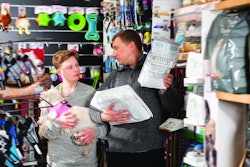
The good news is that the pet food and pet care industries keep growing. The not-so-good news is that makes them inherently vulnerable to continuing supply chain disruptions, according to Worth Turner, CEO of Custom Veterinary Services, a pet supplement manufacturer.
“Supply chain changes aren’t going to stop,” he said, speaking during the American Feed Industry Association’s 2023 Pet Food Conference on January 24, 2023. “They’re inherent in a growth market,” he added, after citing the global market’s size, growth rate and “strong fundamentals” of having a 67% household penetration rate and 73% humanization level.
While Turner’s main topic was mergers and acquisitions (M&A) in the pet space, the unique challenges presented by supply chain disruptions factor into a company’s appeal as an acquisition target, he explained. His outlook and advice on handling such disruptions likely apply to any company, including ones not looking to be acquired.
What’s ahead with the pet food supply chain
Looking ahead at pet food and pet care from a financial perspective, Turner predicted that supply chain issues will (or should) lead companies to renegotiate prices they’re paying, including caps on future increases (i.e., locking in current prices). In addition, he recommends companies negotiate who owns what intellectual property (IP) in the supply chain and seek “secondary supply solutions” –backups and other options – for materials currently with only a single source.
Outside of the supply chain, companies will still experience its impacts in the form of increasing quality and regulatory standards, rising pressure to innovate on a timely basis and, relatedly, a growing focus on speed to market, not only for product launches but also recurring orders.
“Innovation speed is critical today, even though ‘new’ takes time,” Turner said.
How pet food companies can weather the changes
To function and succeed in this environment, Turner suggested these steps:
- Secure contracts now that offer a fair trade of price, IP and volume;
- Build contingency plans to eliminate risks of outages for customers;
- Diversify revenue streams, via customers, products or technologies;
- Invest in quality and regulatory resources (staff);
- Invest in innovation and speed to market;
- Measure the success you deliver.
The last step is critical, Turner said, but too many companies don't do it, or don’t do it well.

















